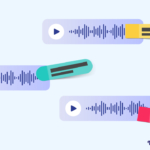3 New Podcast Plan Questions New Podcasters Should Ask Themselves
If you’re just starting your podcast journey, you may feel a bit overwhelmed. There’s so much information available on what you should and shouldn’t do with your podcast. This abundance might push you to freeze from indecision or over-planning. Fear not, my poddy friend, we’re going to go over the three most common questions asked and the better question to ask instead. This tiny mindset shift will help you focus on what’s important for you right now with your new podcast plan.
You Don’t Know Until You Know, You Know?
It’s super hard starting something new. With podcasting, the vulnerability feels magnified because people will literally hear your newness in your audio quality, your microphone choice and, yes, your verbal stumbles. Asking questions as you create your new podcast plan is a good way to improve as you go.
However, it’s hard to know what to ask until you know what you need to know. It’s the ultimate irony of being new at something.
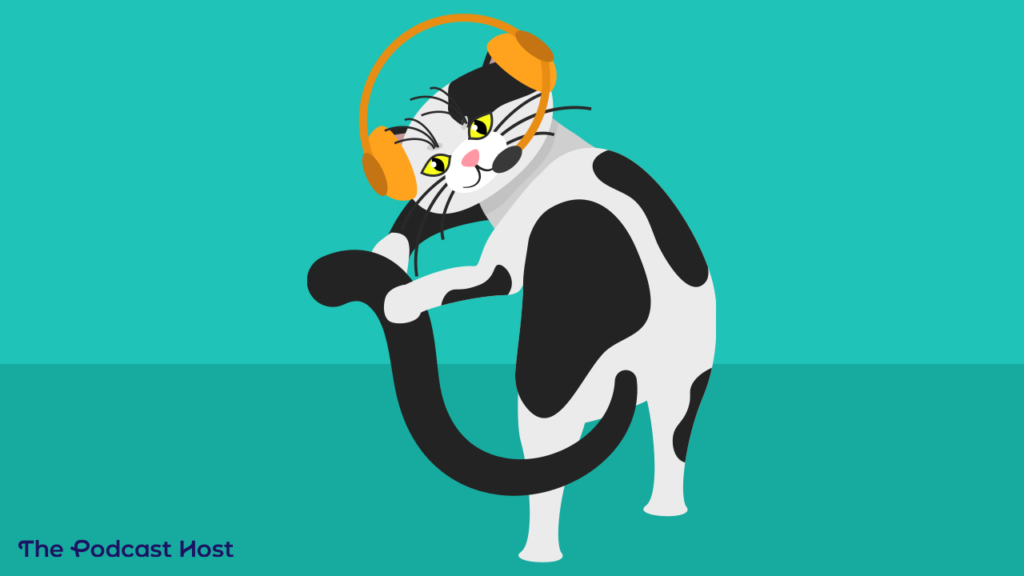
Many new indy podcasters scan other new podcasters’ questions in online groups. It’s tempting to follow the advice that’s given post replies. There can be good information in these online posts, but I have to admit, there’s more likely a lot of bad information. Or, more accurately, a lot of over-information. Most posters don’t take into account how long someone has been podcasting. They’re trying to answer the question asked as best they can. There can also be a lot of hidden (and not so hidden) marketing planted in the answers as well. Scan these posts if you wish, but then focus on the below new podcast plan questions. I promise your beginning podcast life will be less stressful if you do.
How Often Should You Publish In Your New Podcast Plan?
To know how often you can publish podcast episodes and not burn out, you need to create a balanced workflow. When you first start podcasting, your workflow likely looks like this:
- record
- publish
- plan next episode
But after even just six months of regular episodes, your workflow can expand to something like this:
- brainstorm topics
- research topics
- guest outreach and scheduling
- pre-interview test call with guest
- outline or script the episode
- record
- 8.9. first, second and third pass edits: content edits, sound clean-up, moving content around
There can be much more, but I think you get the idea. What you can do with your podcast expands a lot with how long you’re publishing them. In short, you can always do more.
Tip: Add an additional hour of time per month to produce the same amount of episodes for every month you podcast.
For example, for four 30-minute episodes with a maximum of 2 speakers, let’s say that you’ll spend 8 hours in month 1. That means you’ll need 9 hours in month 2, 10 hours in month 3, and so on.
This example includes community questioning time and everything that you do with and for the podcast (marketing, technology experimentation, etc.).
What Podcast Hosting Service Is Good For Your Podcast Now?
Many new podcasters ask, “What’s THE best podcast hosting service?” A hair of a reframing leads us to a much more helpful new podcast plan question: What podcast host service is good for your podcast now? There’s a lot of experimentation that you’ll be doing in the first few podcasting months. The best way to stay creatively flexible is to make your best-educated guess AND prepare yourself to switch hosts from the beginning. Bend like the palm trees below, so you can move with the changes that will happen with your podcast.
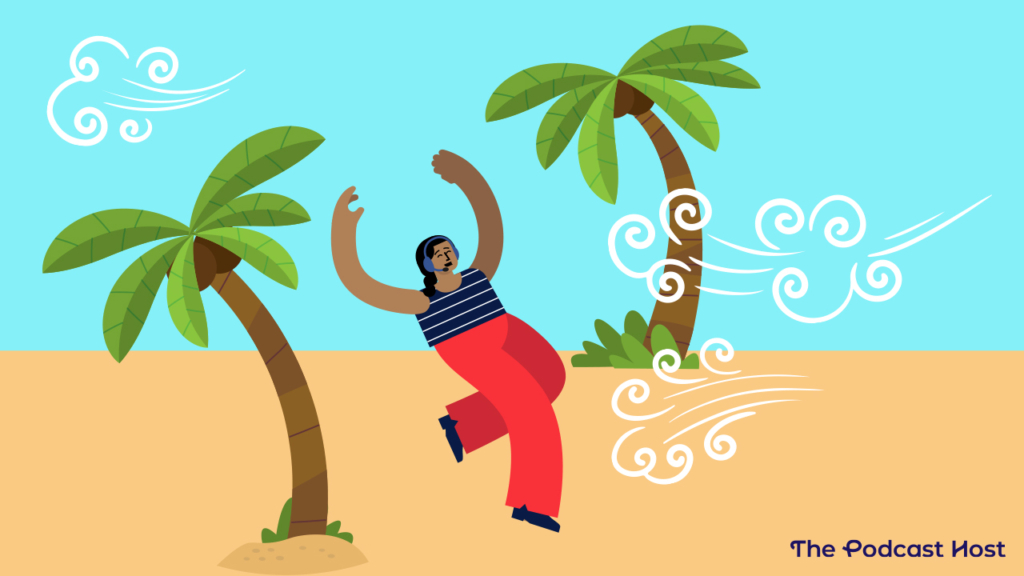
How to Make Your Best Educated Guess When Selecting a Podcast Host?
In essence, most podcast hosts offer the same service but with a unique focus. For example, Captivate is known for having solid marketing resources, RedCircle for making podcast monetization for beginners easy, Buzzsprout for ease of use and so on. A good new podcast plan question is why do you like your current podcast host? Services change constantly, so add these real-time questions to your research no matter what articles you find online.
How to Prepare for Switching Podcast Hosts From the Beginning of Your New Podcast Plan?
It’s getting smoother to switch podcast hosts as time goes on. But it’s still not perfect. Keeping track of a few things from the beginning will help.
First of all, always keep a backup of every final episode. Some people also keep the WAV files and DAW project files. This is a personal choice. At a minimum, have a backup copy of the final episode. Additionally, get into the habit of downloading your podcast analytics.
Here’s what the process looks like in my podcast host, Buzzsprout. You can see the download arrow in the yellow circle in the upper right corner of the screen.
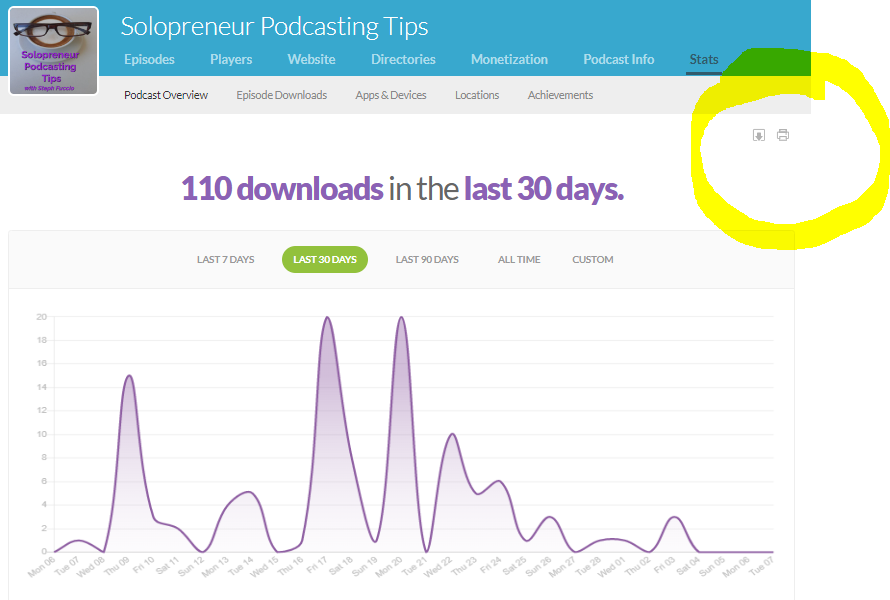
When you click on the download link, they start compiling the data. Buzzsprout then emails a link to a CSV file that looks like this:
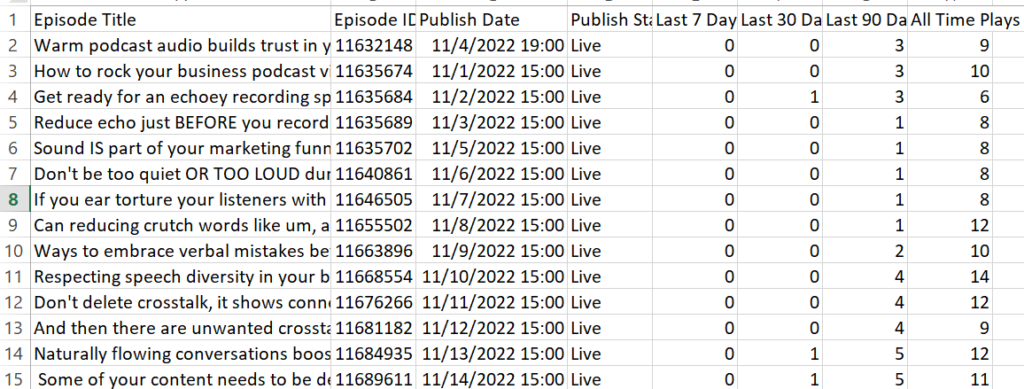
Yes, CSV files look super ugly. The good news is that they transfer easily into Google Sheets. Once you do that, you can reformat it and make cool graphs for your pitch decks. Even if you don’t have monetization plans, you may want to save your downloads from the beginning. When you switch hosts, your downloads do NOT transfer. If you switch podcast hosts without saving your old host’s download information, they will be lost. So save your download stats early and often.
What’s Your Minimal Effective Dose Editing?
I often see the question, “Do I need to edit my podcast?” Unless you have a physical disability or such, making it impossible to use editing technologies, my answer will be 100% YES! You owe your listeners that much ear respect.
A better question to add to your new podcast plan is, “What’s the minimal effective dose editing I can do?” Yes, I’m borrowing Tim Ferris’s phrase, minimal effective dose here, because I think that’s what newer podcasters need when it comes to editing. Minimal effective dose means the biggest improvements with the smallest amount of time.
The reason I’m leaning towards the minimal effective dose is that podcast editing can be a VERY big rabbit hole. You can edit for all kinds of things in the areas of sound clean up, content and sound design.
When you first start your podcast, you don’t want to go down these rabbit holes yet. Instead, it’s better to focus on content. Good content with basic audio standards, of course.
I may get struck down from the audio goddesses for writing this but listeners will only notice audio sound improvements to a certain degree. In short, perfectionism usually only does one thing: burns the podcaster out. Instead, shoot for good audio quality with super strong content.
But content shaping and tightening are very noticeable. So when you’re starting out, learn how to get your audio to basic standards and spend the rest of your efforts on content. Until your content shines, then you can return to the audio rabbit hole if you wish.
Podcast Plan Decision Time Over
So be as social as you wish with other podcasters in the online forums, but keep these three new podcast plan questions as our north stars. Focusing on these will help you build a reasonable workflow that’s sustainable. This will help you keep podfade (aka podcasting burnout) in the form of stopping, far away.
